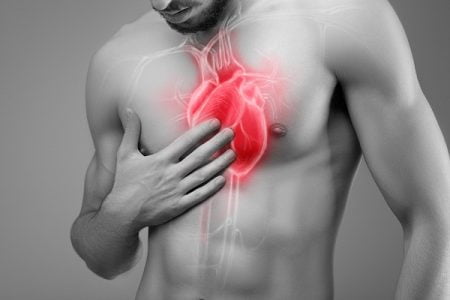Can You Die From An Enlarged Heart (Sudden Death)?
- Updated on: Jun 10, 2024
- 3 min Read
- Published on Apr 19, 2021


Cardiomegaly, commonly known as an enlarged heart, isn’t a disease in itself. Instead, it’s an indicator of another underlying issue. When imaging tests like chest X-rays reveal an enlarged heart, further tests are essential to pinpoint the root cause. One common reason for the heart to enlarge is heart failure, which weakens the heart, making it work overtime to circulate blood throughout the body.
Various factors, from heart diseases to temporary stresses like pregnancy, can lead to an enlarged heart. Depending on the underlying condition, this enlargement might be a temporary or permanent situation.
To address an enlarged heart, treatments could range from medications and medical interventions to surgical procedures. Always consult a healthcare professional for a proper diagnosis and treatment plan.
Sudden death due to enlarged heart
An enlarged heart, also called cardiomegaly, mostly results from another underlying condition or disease such as coronary heart disease, abnormal heart rhythms (called arrhythmias) or other temporary factors such as stresses, pregnancy etc.
A buildup of plaque in the coronary arteries can obstruct blood flow, and may lead to a heart attack. If portions of the heart muscle die, your heart has to work harder to move the blood through the body, which can cause it to enlarge.
An enlarged heart is generally treatable but can result in serious complications without treatment and even sudden death.
Sudden death is the sudden and unexpected death, caused when the heart stops functioning. It occurs most often as a result of continued abnormal electrical activity in the heart. This can be due to structural problems of the heart or as a result of heart attacks. Enlarged heart is one such structural problem.
What is the chance of dying from an enlarged heart?
An enlarged heart can increase the risk of developing serious conditions such as deadly blood clots and cardiac arrest. An enlargement of your heart’s left ventricle, in particular, can lead to heart failure when the weakened heart muscle and stretched ventricles are not able to function properly and do not pump blood efficiently.
A lot depends on the underlying conditions too and how well your heart is able to pump the blood and the extent of enlargement of the heart.
Several other factors that are associated with an increased risk of sudden death when you have enlarged heart are high blood pressure, high cholesterol (High LDL, low HDL), smoking, physical inactivity, obesity, diabetes mellitus, and a family history of premature death (sudden death) due to heart problems.
The risk of sudden death increases during exercise or increased physical activity and for 30 minutes after the exercise or strenuous physical activity. The transient increase in the risk is lower among those persons who do exercise regularly.
Enlarged heart and risks of death in athletes
An enlarged heart is the biggest cause of sudden death among young athletes.
About 125 athletes under the age of 35 and involved in sports die of sudden death in the United States every year, according to estimates by Dr. Barry J. Maron of the Minneapolis Heart Institute Foundation. His institute tracks deaths of this type in a national registry.
An analysis of 387 cases from this registry showed that a majority of them were cardiac-related. About a quarter of them had hypertrophic cardiomyopathy, which causes enlarged heart. Out of them, about 20 % were from a blow to the chest, such as being hit by a ball etc.
An enlarged heart or a thickened heart however doesn’t always mean that you cannot participate in sports. With proper evaluation, guidance, and treatment, you can enjoy sports as your doctor may recommend. However, you may not be allowed to perform all types of activities and participate in all types of sports.
FAQs
How serious is an enlarged heart?
An enlarged heart can be a serious condition that can lead to heart failure and other complications.
What is the life expectancy with an enlarged heart?
The life expectancy with an enlarged heart depends on the underlying cause, severity, and other health factors.
How do you fix an enlarged heart?
Treatment options for an enlarged heart include medication, lifestyle changes, and sometimes surgery.
Can an enlarged heart go back to normal size?
In some cases, an enlarged heart can go back to its normal size with appropriate treatment.
Can losing weight shrink an enlarged heart?
Yes, losing weight and maintaining a healthy weight can help shrink an enlarged heart.












